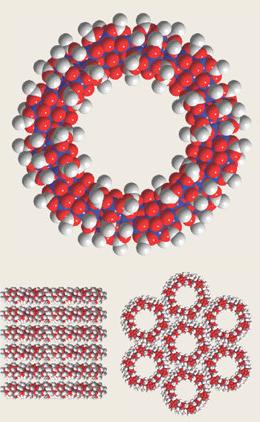| |

| |
In the 1980's and 1990's, 2 separate developments occurred which seemed at
the time to be quite unrelated. First, theorists working on large-scale
quantum phenomena realised that magnetic systems ought to be able to show
large-scale tunneling and coherence phenomena (including tunneling of
macroscopic domain walls, and quantum spin networks). However the theory
also showed at that time that decoherence from nuclear and paramagnetic
spins would be a huge problem, indeed, along with phonons and interqubit
interactions (typically dipolar), they would control the quantum
dynamics of the system (the 'David and Goliath' problem). At the same time
chemists, working in the USA and in Europe, began synthesizing
more and more large-spin magnetic molecules, and preparing them in
stable crystalline structures. Then, working with experimental
physuicists, they began cooling these to low temperatures in
an effort to find the tunneling behaviour predicted by the theory.
These efforts were rewarded in 1994-96 by the first observations, in
Europe and later the USA, of incoherent tunneling relaxation in the Mn-12
molecular magnet system. In the period 1999-2003 very extensive work was
done on systems like Fe-8, V-15, and other molecular species, and the role
of nuclear spins, phonons, intermolecular dipolar interactions, and the
Berry spin topological phase, in the quantum relaxation of the molecular
spins, was elucidated experimentally. In parallel developments,
experiments in the USA on quantum spin glasses also found evidence for
interesting quantum relaxation phenomena, later followed up in Europe.
There are however still a number of crucial challenges facing this now
very large field. There is no convincing demontration of coherence or
quantum control in these systems- a pre-requisite for their use in any
quantum information processing system- even though some experiments give
tantalising hints that this coherence must be there. To achive this goal,
a number of crucial challenges must be met, both in the sysnthesis of new
materials and their theoretical understanding, and new experimental
techniques; and some of the decoherence processes in these systems remain
mysterious. This PITP mini-workshop is inteneded to address these problems
and suggest new strategies for their resolution.
|
| |